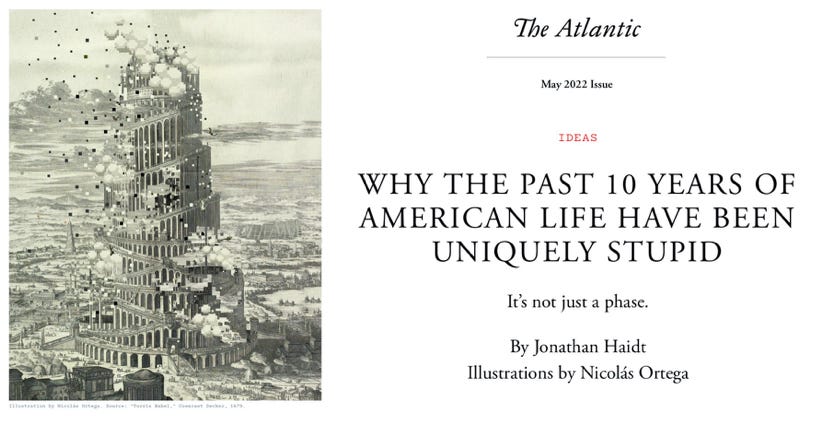"Uniquely Stupid"
The Bible offers some useful metaphors. But let’s not take this Scripture thing too far!
In May 2022, The Atlantic published…
The article caught my eye because the central metaphor Jonathan Haidt used to explain our collective stupidity — the Tower of Babel — is the same metaphor that I used in 2019, when I launched Towers of Babel. Here’s Haidt, at the beginning of his essay:
The story of Babel is the best metaphor I have found for what happened to America in the 2010s, and for the fractured country we now inhabit. Something went terribly wrong, very suddenly. We are disoriented, unable to speak the same language or recognize the same truth. We are cut off from one another and from the past.
At first, I thought Haidt’s interpretation of Babel was boilerplate stuff, not unlike what I learned in Sunday school. By the essay’s midpoint, though, something began to bug me. By the end, I was annoyed: Haidt uses a Biblical metaphor to describe the problem of our collective stupidity, but he avoids any Biblical metaphors when outlining possible solutions. Why?
Why didn’t Haidt take the next metaphorical step — and walk with Abraham, who first appears in the Biblical narrative immediately after the Babel story? Abraham shows up at this critical juncture, just as the Babel project collapses, because he offers an alternative. A different narrative path. A potentially better way. The failure of Babel (Genesis 11) leads immediately to…
Abraham — the father of Judaism, Christianity, and Islam, which collectively has more than 4 billion adherents — is completely absent from this Atlantic essay. Instead, Haidt thinks we should address the problems of our “uniquely stupid,” babble-drunk country by strengthening democratic institutions, reforming social media, and better preparing young people for democratic citizenship.
In other words: Our stupidity problem is best understood with a Bible story, but the best solution is… more public policy.
And that’s when I realized why Haidt’s essay had annoyed me: *I* had ignored Abraham, too.
Who’s afraid of quoting the Bible?
Why did I use the Tower of Babel metaphor in 2019 to anchor an entire media criticism project, and then spend the next three years mostly avoiding a full-throated and unapologetic public engagement with the Bible?
Probably because I was embarrassed. Or scared. Smart people aren’t supposed to talk about the Bible or G*d in public. Faith is a private thing, especially in America. Building a worldview around ancient religious texts is considered unsophisticated, uneducated, and lowbrow. I’m a college graduate, baptized in the Church of Reason, and I didn’t want to be dismissed as a rube or a simpleton.
Yet here’s what I’m beginning to realize: You may or may not be a religious believer, but Abraham still has much to teach us. His story and the ongoing adventure of his extended family have long offered — and still offer — a radical way of seeing ourselves in the world. You might even call the Book’s worldview counter-cultural. Whatever you call it, this fact remains: For thousands of years, something in this Story has touched billions of people.
Why does this Book move people so?
For an excellent example of how to read the Bible as wisdom literature, watch Leon Kass interpret the Tower of Babel story. Belief in magical Old Man In The Sky Woo-Woo is NOT required.






